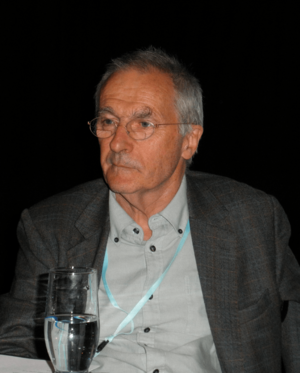Steve Jones (biologist) facts for kids
Quick facts for kids
Steve Jones
|
|
|---|---|

Steve Jones in 2012
|
|
| Born |
John Stephen Jones
24 March 1944 Aberystwyth, Wales
|
| Nationality | British |
| Education | Wirral Grammar School for Boys |
| Alma mater | University of Edinburgh (BSc, PhD) |
| Known for | Books, journalism and broadcasting |
| Spouse(s) |
Norma Percy
(m. 2004) |
| Awards | Michael Faraday Prize (1996) |
| Scientific career | |
| Fields | |
| Institutions | |
| Thesis | Studies on the ecological genetics of Cepaea (1972) |
| Doctoral advisor | Bryan Clarke |
John Stephen Jones (born March 24, 1944) is a British geneticist. He is a scientist who studies genetics, which is the science of how traits are passed down from parents to children. From 1995 to 1999, and again from 2008 to June 2010, he was the head of the Department of Genetics, Evolution and Environment at University College London. He does his research at the Galton Laboratory.
Steve Jones is also well-known as a television presenter and a writer. He has won awards for his books about biology, especially about evolution. He is a popular writer who helps people understand evolution. In 1996, he won the Michael Faraday Prize. This award was given to him for helping the public understand science. He did this through his many radio and TV shows, lectures, and popular science books. He also wrote a science column for The Daily Telegraph newspaper.
Contents
Early Life and School
Steve Jones was born in Aberystwyth, Wales. His parents, Lydia Anne and Thomas Gwilym Jones, met while they were students at the University of Aberystwyth. When he was young, his family often lived with his grandparents in New Quay, Ceredigion, or near Aberystwyth. Later, his family moved to the Wirral, but they still visited Wales for holidays.
His grandfather and great-grandfather were both sea captains. Steve Jones's father was a chemist who worked on cleaning products. As a child, Steve Jones loved staying at his paternal grandparents' house. He spent a lot of time in the attic, which was full of old seafaring items and many books. He read a wide variety of these books. He also visited libraries often. By the time he was 14, he had read all the books by Charles Dickens.
When he was a child in Ceredigion, Steve Jones spoke a lot of Welsh until he was about six or seven years old. He was very interested in local wildlife, especially birds. He went to Wirral Grammar School for Boys. When he was 13 or 14, a school teacher inspired him to study biology.
Jones applied to the University of Edinburgh for his first degree. He was accepted into a zoology course. In 1967, he won a prize for his essay on snails. He continued his studies in Edinburgh to earn his Doctor of Philosophy (PhD) degree. His research was on the ecological genetics of Cepaea, a type of snail. These snails have shells with different color patterns, which makes them great for studying evolution. He became interested in snails because of his PhD supervisor, Bryan Clarke.
Career and Research
After getting his PhD, Steve Jones did more research at the University of Chicago. He studied the genetics of Drosophila, which are fruit flies. This helped him gain more experience in different areas of genetics. Much of his research has focused on snails. He studies how snails can help us understand biodiversity (the variety of life on Earth) and genetics.
Sharing Science with Others
Steve Jones is well-known for sharing science with the public. In 1991, he gave a series of talks on BBC Radio called The Language of the Genes. These talks later became a popular book in 1993 with the same title.
- You can listen to his talks here: BBC Reith Lectures Archive: 1974 – 2010
- You can read the written versions of his talks here: BBC Reith Lectures 1990 – 1999
He also presented a six-part TV series called In the Blood in 1996. This series was about human genetics. He also wrote a book with the same name. In 2011, Steve Jones wrote a report for the BBC Trust about how the BBC reports on science. He suggested that the BBC should be careful not to give too much attention to ideas that are not supported by scientific evidence. He believed it was important to present science accurately and fairly.
Awards and Honors
Steve Jones has received many awards for his work. In 2012, he was chosen as a Fellow of the Royal Society (FRS). This is a very high honor for scientists in the UK. He won the Michael Faraday Prize in 1996 for his work in public understanding of science. He also gave the Reith Lectures in 1991. In 2011, he was elected to the American Philosophical Society and became a Fellow of the Learned Society of Wales and of the Royal Society of Literature.
Personal Life
Since 1977, Steve Jones's partner has been Norma Percy, who is a documentary filmmaker. They got married in 2004.
Steve Jones supports Humanists UK and is an honorary associate of the National Secular Society. He received the Irwin Prize for Secularist of the Year in 2006. In 2011, he became the President of The Association for Science Education.
Thoughts on Education
Steve Jones has shared his thoughts on education. In a 2009 radio interview, he talked about how private schools can affect the education system. He believes that private schools, compared to public schools, often have smaller class sizes, highly trained teachers, and better facilities. He thinks these differences can contribute to social differences in Britain.
 | Leon Lynch |
 | Milton P. Webster |
 | Ferdinand Smith |

